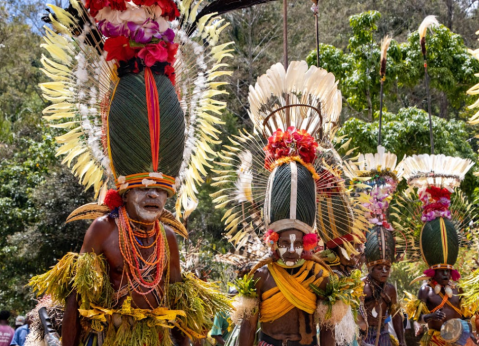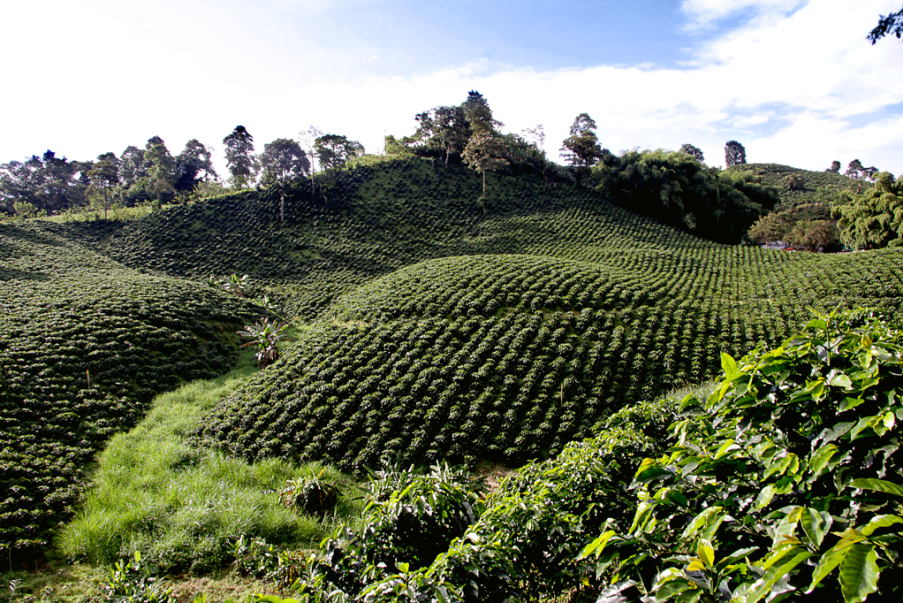Origin of the Month
Our monthly coffee selections!
Learn about our monthly coffee selections! Every 30 days we bring in a new exotic origin and a new premium origin every quarter.

Origin of the Month March 2026
Papua New Guinea Nebilyer Valley
The story of this coffee is one of the most fascinating we have told you and exploring Papua New Guinea (PNG) this month is going to be a lot of fun.
Meet the Farmers Behind Your Cup
Small family-owned farms in the Nebilyer Valley contributed to this lot. Each of the farms is only about 2.5 to 5 acres in size. The famers are members of two tribes; the Ulga and the Kolga tribes, who, until recently, had been at war for almost 40 years. They bring their harvested coffee to the Kuta Mill, which is situated between the two tribes, and it has become a place where the two tribes can find common ground and work together. Papua New Guinea is very remote- so much so, we want you to imagine walking for 3-7 days through mountainous terrain, carrying bags of coffee just to reach the nearest road. That’s the reality for farmers bringing PNG coffee to market.
About This Coffee
This coffee was grown in the Western Highlands of PNG at elevations between 4400 and 6000 feet above sea level. The varietals in this lot are Bourbon and Typica. Bourbon is a tall varietal with near exceptional quality potential when grown at these elevations. It is one of the most culturally and genetically important varietals of Arabica coffee in the world. However, it is susceptible to coffee leaf rust, and coffee berry disease, making it difficult for some farmers to grow successfully. The Typica varietal is also genetically important to the coffee world. It is also a tall varietal, but is susceptible to the same coffee plant diseases as Bourbon.
This coffee is fully washed and sun dried at the Kuta mill, which has been in operation for over 40 years. The mill owner, Brian Leahy, makes a bonus payment after the harvest to farmers who consistently deliver quality cherries. Here’s an interesting fact: Most Papua New Guinea coffee is organically grown, but not because farmers are chasing certifications. Due to the remote locations and economic realities, investing in fertilizers just isn’t practical for PNG’s smallholder farmers. So, the coffee grows naturally, completely weather-dependent, with minimal intervention.
What to Expect in Your Cup
PNG coffees are known for being approachable, yet still contain a complexity that can only be appreciated. This coffee has average acidity, with a high body and above average sweetness. As you sip this one, you may find yourself saying that it tastes like a complex blend of molasses, rep apple and toffee.

Origin of the Quarter Q1 2026
Mexico Finca Fatima Natural
First things first – this coffee earned a cup score of 88.5, making it the highest-scoring coffees we’ve ever brought you in our five-year history. It might surprise you that our top scoring coffee comes from Mexico, but here we are.
We’re proud to bring you another excellent premium coffee. Now let me tell you how the farmers did it.
The Farmers
Ernesto Perez and his sister, Givette Perez Orea, are third-generation coffee farmers. Their family has been growing coffee on Finca Fatima (finca means “farm” in Spanish) for almost 100 years. Let’s face it – nobody does something for a century without getting really, really good at it.
Their 49-acre farm is in Coatepec, Veracruz, which is Mexico’s oldest and most historic coffee-growing region. Arabica coffee trees were first introduced here in the late 1700s by a Spaniard named Juan Antonio Garcia. The farm sits at about 4,100 feet above sea level and is dedicated to cultivating premium lots of Criolla, Typica, and Geisha varietals, among others. They achieve these premium lots by focusing on careful farming practices and innovative processing methods.
Seed-To-Cup
Here’s the twist – Ernesto and Givette are also coffee roasters, which sets them apart from most coffee farmers. Every single decision this brother-sister team makes on the farm is made with the unique ability to taste what they’ve grown and roasted.
In essence, no coffee leaves their farm without them knowing, beyond a shadow of a doubt, that it’s of the highest quality.
Finca Fatima is special in another way too – biodiversity. They also produce honey, grow and maintain citrus groves, and offer agrotourism experiences. Visitors to the farm see firsthand what careful, sustainable farming practices do for the quality of coffee this farm produces.
The Coffee
Most of Finca Fatima’s lots are washed process, but this one is different. This lot was processed naturally, where the beans are dried in the cherry. The natural process allows the cherry’s sugars to infuse the beans during fermentation and drying. The final cup is complex and layered, with standout fruity character. While sipping this gem, you may catch notes of strawberry, tropical fruit, cane sugar, and lemon.